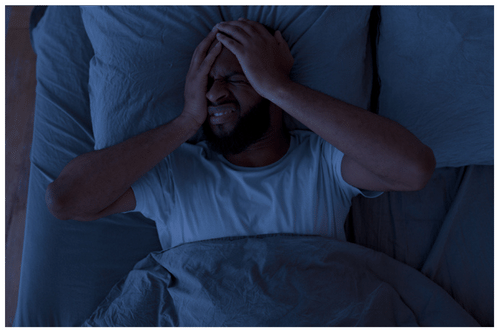5 Tips on How to Calm Down After a Nightmare
Having a nightmare (or perhaps a couple) can make you feel alarmed. Some people wake up out of breath, possibly sweating, fast heartbeat, and other symptoms. It’s kind of like those TV or movie scenes. Sometimes, this is considered a panic attack. Almost everyone has nightmares at some point in their life, including children and adults. Some people get them more often than others for different reasons. It’s first important to understand what those nightmares often are. Then, we’ll learn how to calm down after a nightmare and how to prepare for next time.
Most Common Nightmares
There are a few common nightmares that we may have. First, we can have nightmares about our everyday stressors. I cannot tell you how many times I have dreamt about work! We dream about work because it’s part of our daily schedule. However, sometimes those dreams can turn into nightmares if you are feeling some anxiety about work. For instance, maybe you’re worried about upcoming deadlines, overall work performance, your boss, or conflicts with co-workers. Speaking of conflicts, we may have nightmares about confronting someone. This may indicate a fear you have in that situation. Other everyday stressors that can appear in nightmares include parenting, relationship issues, accidents, and others. Some nightmares don’t make visual sense but could reflect worry or fear, such as teeth falling out or being chased.
Another type are nightmares from childhood trauma. A lot of my clients have had some form of trauma as children. This can be physical or sexual abuse. Others have had a lack of nurture and love from a parental figure as a child. These nightmares can occur if there is some unresolved hurt from what happened in that period in your life. It makes sense why those nightmares would happen. Our childhood is such a vital phase in our lives! Harms or threats towards us as children, as we learned about the world and people around us, would’ve affected us.
Lastly, we may have nightmares about our adulthood trauma. Adulthood trauma can be anything from an assault to a sudden loss to an abusive relationship. Maybe you’re having triggers or reminders of that situation, and your mind and body are responding in certain ways. Because of the possibly heightened responses, your mind may be bringing those hurts right into your sleep. The unrest of the trauma could be the reason why you are having nightmares about it.
Although having nightmares feels uneasy, don’t feel bad! Think about it like this: our brains may be trying to help us. It could be our brain’s way of alerting us that something is wrong. Your brain is not resting completely, and it could be telling you that something must be done. Your body’s physical response when you wake up from a nightmare is a good sign. If anything, it is the most obvious signal that there is unrest. Therefore, addressing these nightmares, stressors, and hurts can help you feel relief.
5 Tips to How to Calm Down After a Nightmare
So, you just had a nightmare. You have woken up with your eyes wide open. A flood of emotions and thoughts are running. You’re confused, worried, or scared. Don’t worry; here are some ways to calm down (in no order):
Use your 5 senses. This type of grounding technique helps you to become aware of that very moment. Identify what things you can see, hear, touch/feel. You can even try to recognize what you are smelling and tasting. For the latter, see if popping a gum, mint, or even ice helps you to focus on its flavor and temperature. You may see that using your 5 senses helped you to distance from the thoughts of the nightmare.
Use paced breathing. Inhale and hold for a few seconds, then exhale longer. I encourage my clients to say a relaxing or pleasant word during that exhale. This helps to slow down whatever alarmed sensations are going through your body.
Say and repeat a coping or grounding statement. This can be anything, such as “I’m good” or “I’m safe here.” You can also say, “I can overcome this.” You want to say anything that you know will be meaningful for you.
Use cold water on your face. The temperature of cold water helps. The water is at least 50 degrees Fahrenheit. Therapies, like Dialectical Behavioral Therapy, instruct to put your face in a bowl of water or hold a pack/bag of water to eyes and cheeks. Hold your breath for 30 seconds. This helps to slow down the sensations in your body.
Last, but not least, if you are planning to try to go back to sleep, attempt relaxing exercises. You can search them through some applications, such as Calm. You can also search on YouTube. Allow yourself to carefully listen. Allow yourself to follow the instructions. This will help to slow and balance out your nervous system.
I always encourage all my clients is: practice these skills daily. When we go from 0-100 (really quick), our brains are too alarmed to tell time, let alone think clearly. Practicing these skills even when you are feeling okay during the day will help. You will be able to retain this information better. You will feel prepared in case you have a nightmare and need to apply these skills.
What to Do After a Nightmare
Now that you know how to calm down, it’s essential to know what to do in the long run. Here are some things to keep in mind:
Prepare for the next time you’re going to sleep. This may look like doing relaxing exercises before bedtime. You can also repeat some of those grounding, coping statements you created earlier. You can also rescript how your nightmare will end. Envision that different outcome. Listen to soothing music. Pray. Meditate.
Be mindful of what you watch and hear. If you’re anything like me, I am sensitive to what I hear and see. That’s why I don’t watch horror movies because I just know my brain will have me dreaming about them (LOL). What we focus or dwell on can possibly show up in our dreams and nightmares.
Seek professional help. Remember how earlier I mentioned that unresolved hurts from traumas maybe lingering? If this is you, you may benefit from seeing a therapist or counselor. It's best if you seek a trauma focused therapist. They can apply their knowledge and expertise. Even if you’re just experiencing daily stress, seeing a counselor can still help you to process those factors. Also, some therapists may be able to help you seek the meaning behind your nightmares. Maybe you’re unsure about why they are happening. Perhaps you’re uncertain about their meaning. Sometimes dreams and nightmares can be distorted or unorganized. There are some therapy approaches to help in seeking that meaning. For example, I am trained in Accelerated Resolution Therapy (ART). ART can help interpret those dreams and nightmares. It also guides you to rescript the outcome of those nightmares. This can greatly reduce those uneasy, negative sensations you previously had. Pretty amazing, right? In Internal Family Systems (IFS), we may explore the part of you that is showing these nightmares and understand why. After all, these protective parts tend to have very good reasons to do what they do in our inner system.
Having nightmares can be scary and overwhelming. However, it's helpful to address them. They don’t have to continue affecting your sleep and peace. Knowing what to do soon after a nightmare is pivotal. Moreover, keeping in mind how you can prepare for next time and possibly seek professional help may be life changing.



